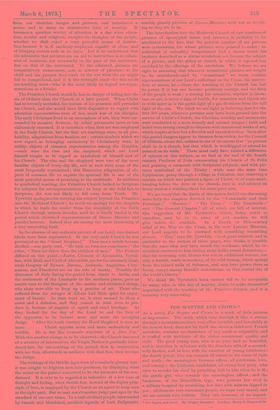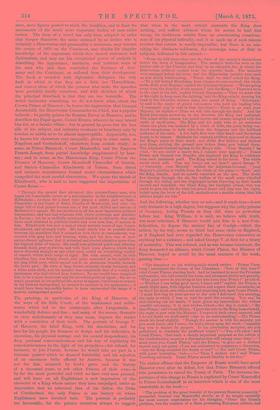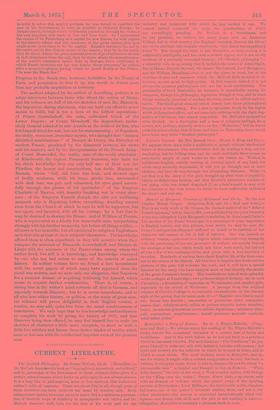FOR SCEPTRE AND CROWN.*
As a novel, For Sceptre and Crown is a work of little interest or importance. The story, which runs through it like a stream through a mountainous tract, very often invisible, and invariably at the lowest level, does not by itself rise above a third-rate French novelette, contains no characters of any mark or originality, and is stuffed with incidents of the oldest sensational quality and style. The good young man, who is so pure and so beautiful, and is therefore in relations with the dissolute wife of a scound- relly banker, and in love with the sweetest of young countesses ; the Jesuit priest, who can commit all crimes in the cause of right and truth ; the meaningless German officer, all patriotism, love, and courage ; the Lutheran candidatus, all evangelical piety, who tries to murder his rival by preaching bell to him when he is ill ; the gentle girl, who rewards the meaningless officer ; and the bankeress, of the Brinvilliers type, who poisons her rival in a military hospital by scratching her face with scissors dipped in pus ; all these are very customary people, we hope very unreal, and we are certain very tedious. They are, however, of no import- • For Scepere and Crown. By Gregor Samarovr. London : Henry S. Sing and 00.
ante, mere figures posted to mark the localities, and to limit the movements of the much more important bodies of men under review. The form of a novel has only been adopted in order that Gregor Samarow, the name assumed by an author who is certainly a Hanoverian and presumably a statesman, may recount the events of 1870 on the Continent, may display his singular knowledge of the arguments which then moved statesmen and diplomatists, and may use his exceptional power of analysis in describing the appearance, intellects, and habitual ways of the men who just then controlled the fortunes of Ger- many and the Continent, or suffered from their development. The book is crowded with diplomatic dialogues, the only fault in which is that they are a little too Thucydidean, and convey ideas of which the persons who make the speeches were probably hardly conscious, and with sketches of which the principal drawback is that they are too honorific. The writer insinuates something, we do not know what, about the Crown Prince of Hanover ; he leaves the impression that General Arentschild, the Hanoverian Commander-in-Chief, was a popular imbecile ; he gently quizzes the Russian Envoy at Hanover, and he describes the Papal agent, Count Rivero, whoever he may intend him for, as a fanatic villain ; but in general he gives but the best side of his subject, and indicates weakness or treachery only by touches so subtle as to be almost imperceptible. Apparently, too, he knows his characters very unequally, giving in some cases, as Napoleon and Gortschakoff, characters from outside study ; in some, as Prince Bismarck, Count Manteuffel, and the Emperor Francis Joseph, from partial knowledge supplemented by hear- say ; and in some, as the Hanoverian King, Count Platen the Premier of Hanover, Count Mensdorff Chancellor of Austria, and State's - Chancellor Klindworth of Vienna, from direct and intimate acquaintance formed under circumstances which compelled the most careful observation. We quote the sketch of Klindworth, who is said to have suggested the importation of Count Beust :—
" Through the opened door advanced this extraordinary man, who began his remarkable career as a schoolmaster in the neighbourhood of Hildesheim ; he then for a short time played a public part as State- Chancellor at the Court of Duke Charles of Brunswick, and after the tragic fall of that prince became ono of the most skilful and zealous of Metternich's agents. He was involved in all the most important political transactions, and had had relations with every sovereign and minister in Europe ; yet he so skilfully enveloped himself in obscurity, that only those most initiated in political circles had ever seen him, or spoken to him. Klindworth was now a man of about seventy years of age, broad- shouldered, and strongly built. His head, which was so pressed down between his shoulders that it seemed to lurk there in concealment, was covered with grey hair, fast turning white, and his face was of such extraordinary ugliness, that it attracted and riveted attention more than the highest order of beauty. His small eyes glittered quick and piercing beneath thick grey eyebrows, and with their keen glances, which they never directed straight at any other eyes, seized on everything worthy of remark within their range of sight. His wide mouth, with its thin bloodless lips, was firmly closed, and quite concealed in the middle by his long thick nose, which spread out to an enormous breadth towards the lower part. He wore a long brown overcoat closely buttoned, and a white neck-cloth, and his manner was completely that of a worthy old tradesman who had retired from business. No one would have imagined him to be a most dexterous and far-travelled political agent ; the art so much practised in his political life, never to appear, but always to remain in the darkest background, he seemed to exercise in his appearance ; it would have been impossible better to have represented the image of a modest, unimportant person."
The painting, in particular, of the King of Hanover, of
the ways of his little Court, of the weaknesses and noble- nesses which led to the catastrophe after Langensalza, is wonderfully delicate and fine ; and many of the scenes, dramatic or even melodramatic as they may seem, impress the reader with a conviction of their truth. The portrait of George V.
of Hanover, the blind King, with his absolutism and his love for his people, his firmness in design and his indecision in execution, his physical courage and his mental despondency, his deep personal conscientiousness and his way of regulating bis conscientiousness by the light of his prejudices—his refusal, for instance, to join Prussia, because he would take no part in a German quarrel which he deemed fratricidal, and his rejection of an enormous bribe offered by Austria, because it was not for him, monarch by God's grace and the history of a thousand years, to rob other Princes of their own—is by far the most powerful and vivid we have ever seen painted, and will leave on all Englishmen a new impression of the character of a King whose nature they have misjudged, under an impression that he inherited that of his father, the Duke of Cumberland, the only Prince in our history on whom Englishmen have lavished hate. The portrait is probably too favourable, for the painter contrives always to suggest
that when in the most critical moments the King does nothing, and suffers advisers whom he scorns to lead him wrong, his feebleness results from an overweening conscious- ness of his physical infirmity, and it is made up of such minute touches that extract is nearly impossible, but there is no mis- taking the obstinate nobleness, the sovereign sense of duty to subjects, indicated in this extract :— " From the hill above they saw the lines of the enemy's skirmishers. before the town of Langensalza. The enemy's batteries were on the farther side of the Unstrut, and kept up an energetic fire, to which the Hanoverian artillery replied from the opposite bank. The infantry were engaged before the town, and the Hanoverian cavalry were seen on side slowly withdrawing. Where shall We ride ?' asked the King. = To a hill behind Merxleben, from whence we can overlook the whole battle-field, your Majesty,' replied the Adjutant-General.= We are going away from the thunder of the cannon !' said the King.—' There is a turn in the road to the left,' replied Colonel Dammers.—' Then we must ride to the right to keep near the fighting,' said the King calmly, turning his head in the direction whence came the sound of firing. Schweppe,' he said to the major of guard cuirassiers who held his leading rein, I command you to ride in that direction.'—' There is no road, your Majesty,' he replied.—' Then we will ride through the fields.' And the Royal procession moved on, in the direction the King had indicated. The sound of the cannon was heard nearer and nearer, mingled with the rattle of small arms. The King and his suite rode to an eminence where the plain was bounded by a chain of hills, the party being ren- dered conspicuous to both sides from the dragoons and the brilliant uniforms of the suite. A few balls flew over their heads and the horses began to be uneasy. Suddenly the enemy artillery appeared to choose- the King's party as their mark, and shells flew thicker and thicker over them, striking the ground now before them, now behind them. The Adjutant-General sprang to the King's side. Your Majesty !' he. cried, ' we are under a heavy fire, I conjure your majesty—' Count Platen and General von Brandis also implored the King to withdraw from such imminent peril. The King reined in his horse. The whole escort stood still. 'Can my troops see me here ?' asked George V. —' Certainly, your Majesty,' replied the Adjutant-General, your Majesty's position is visible from the whole of the plain.'—' Good,' said the King, simply. And he quietly remained on the spot. The shells. flew hissing through the air, the ballets of the small arms whistled through the valley, and the frightened horses throwing up their heads snorted and trembled ; the blind King, the Guelphic prince, who was ready to give his life for what his proud heart told him was the right, halted upon the brow of the hill, motionless as a marble statue, that his soldiers might see him."
And the following, whether true or not—and it reads true—isnot only dramatic in a high degree, but suggests why the petty princes of Germany, hating Prussia as they did, were so powerless before her. King William, it is said, we believe with truth, was most reluctant, if Hanover would join him in a new Con- federation, to depose the ancient line of Guelph—which the author, by the way, seems to think bad some claim on England, as if England had ever regarded the Hanoverian connection as anything but a nuisance—and asked George V. at first for a treaty of neutrality. This was refused, and as war became imminent, the King demanded an alliance, which Count Platen, the Minister of Hanover, hoped to avoid by the usual resource of the weak, gaining time :—
" The timepiece on his writing-table struck twelve. Prince Ysen- burg !' announced the Groom of the Chambers. 'Now, at this hoar ?' cried Count Platen, starting back. And he hastened to meet the Prussian ambassador, who had entered the room, and advanced slowly and gravely.. ' What good news do you bring at this late hour, dear Prince ? ' he asked. —' Whether I can bring good news, I know not ? ' replied the Prince, a small slight man, with regular features and a spare black moustache, as he fixed his black eyes with a sad and enquiring look upon Count Platen ; ' I must first beg for your answer to the note I delivered this morning, the reply to which I was to wait for until this evening. You see,' he said drawing out his watch, have given my instructions the widest possible extension • it is now twelve o'clock—the day is ended.'—' My dear Prince,' said Count Platen, 'I gave the note to the King immediately, the reply is now with his Majesty ; I expect it back every moment, and I do not doubt we shall easily come to an understanding.'—The Prince shook his head slightly. Though the answer is with his majesty, yet you must know, and I must,—he laid a stress upon the word—' urgently beg you to impart its purport. Is the proposition accepted, are you
authorised to conclude the proffered treaty ? You will allow,' said Count Platen, ' that such a deeply important proposal as the reform of the Confederation requires a discussion that will occupy some time.'—' I must press you, Count Platen,' said the Prince, 'to give me a distinct answer upon one point,—I am not authorised to commence a discussion, —has the King accepted the treaty or not ? '—' No,' said Count Platen, with great hesitation, 'but—'—' Then I declare war !' said Prince Ysenburg solemnly. Count Platen stared blankly in his face."
The author affirms that the Emperor of Russia would have saved Hanover even after its defeat, but that Prince Bismarck offered him permission to cancel the Treaty of Paris. The immense im- portance of this change to Russia is explained by Count Manteuffel to Prince Gortschakoff in an interview which is one of the most remarkable in the book :—
" The problem of the great founder of the present Russian monarchy," proceeded General von Manteuffel slowly, as if he sought carefully the most correct expressions for his thoughts, "Peter the Great's problem, was the creation of a State possessing European culture, anti
in order to solve this mighty problem he was forced to establish the seat of his Government as near as possible to cultured Europe ; he formed canals, through which civilisation poured in through the veins of his vast kingdom, and made it live and bear fruit. So I understand the choice of St. Petersburg as a capital for new Russia, for with regard to the interior affairs and the resources of the great nation, this spot could never have risen to be its capital. Russia's resources lie, not in the north, not in this distant corner of the empire ; they lie in the south, they lie there, where the great national powers of productiveness stream in rich abundance from the soil, they lie there, where the natural course of the world's commerce unites Asia to Europe, those continents to which Russia stretches out her two hands; these resources," he added, after a moment's silence, during which he gazed firmly at the Prince, "lie near the Black Sea! "
Progress to the South was, however, forbidden by the Treaty of Paris, and permission to tear it up was worth to Russia more than any probable acquisition of territory.
The method adopted by the author of describing policies is to relate interviews between those who direct the action of States, and his volumes are full of kit-cat sketches of men like Bismarck, the imperious, daring statesman, who can hold out offers he never means to fulfil, but is yet a hero of the loftiest aspirations ; of Prince Gortschakoff, the calm, cultivated Greek of the Lower Empire ; of Count Mensdorff, the despondent, melan- choly General selected to rule Austria at the crisis of its fate, who felt himself fitted for war, but not for statesmanship ; of Napoleon, the sickly, worn-out, irresolute mystic, who thought that "cannon disturbed combinations ;" of Drouyn de Lhuys, the Richelieu of modern France, paralysed by the disaccord between his views and his master's, and by the disorganisation of the French Army ; of Count Manteuffel, the crafty, man-of-the-world absolutist ; of Klindworth, the typical Permanent Secretary, who finds for his chiefs knowledge they can only half use ; of Herr von der Pfordten, the honest and conscientious, but feeble Minister of Bavaria., whose "full, tall form was bent, and showed signs of bodily weakness, while his large, gentle face, surrounded with dark hair, was pale and exhausted, his eyes gazed mourn- fully through the glasses of his spectacles ;" of the Empress Charlotte of Mexico, with insanity breaking out in every utter- ance ; of the Emperor Francis Joseph, the able yet vacillating monarch who is Hapsburg before everything, dreading control even from the Church of which he says he will be supporter, but not agent, and haunted, with all his courage, by a fear that he may be destined to destroy his House ; and of William of Prussia, who is represented as a kindly but immovable man, sympathising strongly with his brother monarchs, but before all things soldier,— all more or less honorific, but all calculated to enlighten Englishmen as to that side at least of their subjects' characters. The knowledge
offered them is often superficial, as they will perceive when they compare the accounts of Bismarck, Gortschakoff, and Drouyn de Lhuys with the accounts of the Hanoverians among whom the author lived, but still it is knowledge, and knowledge -conveyed
by one who has had access to many of the sources of secret history. In neither volume have we found a fact inconsistent with the secret papers of which many have appeared since the novel was written, and we note only one allegation, that Napoleon for a moment dreamt of acquiring Schleswig for himself, which seems to require further confirmation. There is, of course, a strong bias in the writer's mind towards all that is German, and especially towards Hanover ; but he is never immoderate, and to all who love either history, or politics, or the study of great men, his volumes will prove delightful in their English version, a version, we may add, quite free from the usual cumbrousness of translators. We only hope that he has knowledge and inclination to complete his work by giving the history of 1870, and that Hanover being then effaced, he may feel himself free to make his sketches of character a little more complete, to show us with a little less subtlety and finesse those darker shades of motive which more or less mix with the intellectual impulses even of the greatest men.




































 Previous page
Previous page